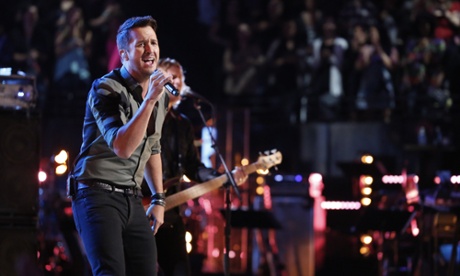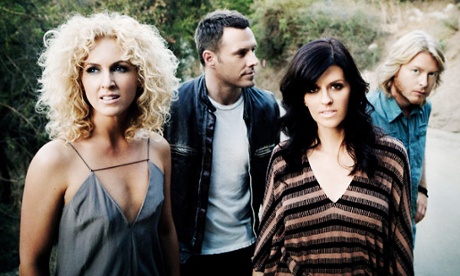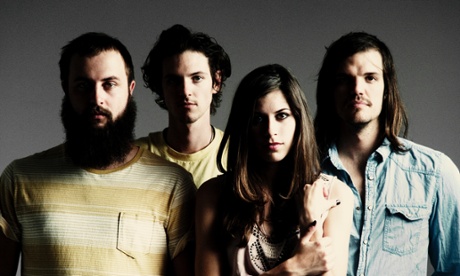“Americana” is a term that every country music fan has likely heard, though few, if any, are able to explain exactly what it means. When Americana gets written about, it’s described as a genre loosely associated with beards and banjos and the recent folk-rock revival sparked by the mainstream success of bands like Mumford & Sons and the Lumineers. The Americana label is applied liberally to R&B, blues and traditional country artists as well, which can make things confusing. For the past 20 years, Americana has lacked a clear identity – and that’s partly by design – but everything is changing quickly.
A few weeks ago, when US Weekly broke the news that Miranda Lambert was dating much talked-about soul singer Anderson East, the tabloid labelled him as an “Americana/R&B musician”. That identifier wasn’t all that significant in its own right, but it marked a mainstream embrace of a term that once felt too inside-baseball for a national magazine. The same could be said of Jason Isbell’s recent feature in GQ magazine, which ran with the headline The New King of Americana Music. Isbell and East are, in fact, big stars within the independent music world, but to mainstream masses they’re relatively unknown, and it’s notable that in 2016 they’re accruing clout as bona fide Americana stars.
Americana got another dose of exposure last week when the hottest producer in all of Nashville, Dave Cobb, who produced both Isbell and East’s most recent records – not to mention Chris Stapleton’s dark horse smash Traveller – was given the keys to Music Row’s historic Studio A, which was saved from demolition in 2014. Cobb is arguably the biggest fish in the Americana pond, and he’s responsible for producing albums by critical favorites like Lindi Ortega, Sturgill Simpson and Lake Street Dive, all of whom are finding audiences in country masses who have become disenchanted with the pop leanings of country radio.
With a keen ability to make vintage, acoustic production feel utterly fresh and modern, Cobb is one of the main forces behind country’s recent sonic schism, and he was named to the board of the Americana Music Association (AMA) late last year. Now, he’s setting up shop on the most famous street in all of Nashville, and so it appears that Americana is only going to grow in stature – whether that’s with the embrace of the country music establishment or in opposition to it.
Of course, Americana didn’t arrive overnight. The term’s roots date back to 1995, when an Americana airplay chart began to be published in the now-defunct radio magazine, Gavin Report. The chart caught the attention of a generation of aging country artists who found themselves shuffled out of the mainstream country conversation in favor of flashier acts like Garth Brooks and Shania Twain. But it wasn’t until 1999 that a group of about 30 music industry professionals (including “Americana” trademark-holder Jon Grimson and No Depression co-founder Grant Alden) met at South by Southwest to discuss the idea of establishing Americana as a genre. Later that year, the same group officially founded the Americana Music Association, and artists like Emmylou Harris, Rosanne Cash, Jim Lauderdale and Rodney Crowell quickly became flag wavers for the newfound format.
Of course, not all artists were willing to categorize themselves as Americana, especially because the term could be taken as an official retreat from a career as a mainstream country music star, but that stigma has mostly dissolved over the past few years. Almost two decades after its founding, the AMA boasts over 2,000 paying members, an annual music conference, and a festival that culminates in an awards show that began airing on PBS in 2012. It’s quietly become a star-making category in its own rights, and what Americana artists lack in radio ubiquity, they make up for in ticket and album sales.
The man most obviously responsible for Americana’s recent rise in prominence is Jed Hilly, a former Sony marketing executive who helped make the band Creed a global phenomenon. Hilly moved himself and his three children from New York to Nashville in the wake of 9/11, and after spending a few years marketing the Roy Orbison catalogue, he became the executive director of the AMA in 2007. In his eight years as the head of the organization, Hilly has grown membership substantially and successfully spearheaded efforts to get Americana included in Merriam-Webster dictionary and to have the Academy recognize Americana with its own Grammy categories. (It now has three.)
If all that makes Hilly sound like a cunning marketer and nothing else, that’s not especially accurate. He’s more of a sensitive artist-type than that – the kind of music fan who’s prone to ramble on about Picasso’s use of chiaroscuro while discussing Mumford & Sons or movingly recount a conversation he had with Rosanne Cash in her late father’s empty home.
Hilly understands how artists think, and because he knows they’re prone to feel shackled by the rules of a genre’s sound (and because he knows listeners are increasingly willing to venture into other genres), he’s not overly interested in regulating how Americana is defined, instead emphasizing its authenticity. When pressed, he only offers this vague definition: “If you can taste the dirt through your ears, that is Americana. It is music that is derived or inspired by American roots traditions. I think that’s pretty solid.”
That means that any piece of music from zydeco to gospel can be deemed Americana music if the members of the AMA say that it is. And, as Hilly argues, that only makes the moniker more powerful. “It’s on virtually every format of radio,” he says. “Why would I fight a commercial monstrosity to get my own 24/7 channel when I can be on every channel in every town? I may not be constant, but if I’m everywhere, that’s a good thing. I think that’s how we all listen to music at the end of the day.”
There’s a certain irony in the AMA trying to create an Americana genre at all, since one of its major cultural goals is to undermine the pre-existing concepts of genre completely. It lets artists make the music they want to make without much regard for whether it will be played on commercial country, rock or R&B radio. That’s partly because, according to many purveyors of Americana, the traditional model of format segregation is being rendered antiquated by the modern marketplace.
“It used to be that you needed a physical space to put genres in because they occupied a place [in a record store] that you could point and say, ‘That’s over there,’” says Baron Lane, who runs the popular Americana website Twang Nation. “With iTunes, you don’t need that.”
Younger minds, says Lane, are less burdened by the need to only listen to one kind of music in the age of Spotify. That may well be true, but humans still like organising things, and so, for now, the genre label Americana is a somewhat necessary evil, though it seems to me that it’s actually more of an ethos or a curation method (a bit like the Oprah’s book club sticker) than it is a genre with hard-and-fast rules about what dictates its sound. Using the record store analogy, Americana is simply a new set of shelves where records that once were placed in other genres can now be sold. That’s not so menacing, really.
And it isn’t all that different than what happened with rock’n’roll, Hilly says. Back in 1951, Ohio disc jockey Alan Freed became wildly popular by playing some of the buzziest “race records” in the country on his radio show. Feeling that these “rhythm and blues” songs actually represented a new sound in their own right, he began organizing them in a show he called The Moondog Rock‘N’Roll Party. Freed is credited with coining the term “rock‘n’roll”, which quickly became ubiquitous with the rise of Elvis Presley and his shaking hips. Today, rock‘n’roll has a hundred spinoff genres of its own, including everything from hard rock to screamo to “alt”. If rock n’ roll can get invented, then why can’t Americana too?
Country fans have perhaps the most confusing relationship with Americana out of anyone, and that’s because listeners, as a community, have been engaged in a culture war since the 1990s fighting over the genre’s soul. On one side, there are those who fully embrace a bigger, poppier Nashville sound. On the other side, there are those who argue that Nashville needs to toss Luke Bryan to the curve and re-embrace its rootsy, outlaw culture.
The rise of Americana adds an interesting ripple to this debate. Traditional country fans are very taken with musical output of artists like Emmylou Harris or Brandi Carlile or Jason Isbell, but they’re often eager to claim them exclusively as country singers in the quest to re-establish credibility to the genre that they feel has lost its way – even if there’s little chance that modern country radio would ever include these artists’ spare music on their playlists. Americana fans aren’t especially interested in fighting over genre, though, especially not with country tastemakers. As they see it, there’s little benefit in fighting a ridiculously expensive battle with the Nashville establishment.
“I get frustrated sometimes when people are so critical of bro country,” says Hilly. “I’m like, just let them do their thing! It’s not what we do, so let them do what they want.” In this way, Americana represents a way forward for country music. With Americana as a viable label, traditional country music can still get made, it just might not get called country music for very much longer. If it does, that’s great. If it doesn’t, who cares?
Major label country artists like Kacey Musgraves and Ashley Monroe, both of whom have had notoriously weak country radio support despite being lavished with critical praise, have lately found more traction on the Americana airplay chart, and I confirmed last year that Musgraves’ team actually commissioned a radio promoter to help take her new music onto Americana stations. Granted, there aren’t many self-identifying Americana radio stations per se – but the AMA has been compiling a database of stations across America whose playlists include a substantial number of songs from albums in the top 40 Americana albums chart.
Hilly says they now have about 80 partner stations in their books, and he has a longterm goal of building a legitimate radio promotion map that could actually prove effective for artists like Musgraves and Monroe, rather than the ineffective and expensive radio tours that many country stars continue to participate in. “I hear all about radio tours in the country world and I think, ‘What are they doing?’” says Hilly. “Why does it cost $800,000 to get a single to work at country radio?” (For more on this subject, read Ashley Monroe’s reflections on her most recent promo tour.)
If there’s any danger to Americana’s momentum, it’s that many choose to roll their eyes at the word, grouping it in with the oft-criticized “artisanal movement” that helped make mason jars and burlap tablecloths a hackneyed wedding setting in just a few short years. Music critics often find the folky, homespun earnestness of the lyrics twee, and they assume the fans of such lyrics are little more than faithful hipster sheep. But Hilly says that such suppositions sell both the music and the fans short. “There’s this hipster notion that’s on some level, post-Mumford, getting propagated,” he says. “Well, that’s OK … if the New Yorker or Entertainment Weekly wants to make fun of that community wearing suspenders and having beards and spending too much time drinking lattes in Williamsburg – I know in my heart it’s more than that. I think it’s one of the only genres, along with jazz and others, that allow the artist to be comfortable in their own creative expression.”
It’s that welcome attitude and freedom to create that’s attracting so many country artists to the Americana fray, and with momentum from stars like Isbell, Simpson and East – there’s no telling how big the pseudo-genre could become in the coming years. As such, country fans should view Americana as an opportunity, not a threat, and they should resist the urge to turn their backs on traditional country artists, even if, for the sake of their careers, they one day stop calling themselves “country”.











